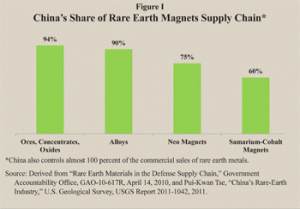Earlier this year, a Department of Defense analysis stunned many with its conclusion that concerns about Rare Earths supply shortages were exaggerated. Jeffery A. Green, founder of the Strategic Material Advisory Council and American Resources expert, explains how the Pentagon misses the mark in its assessment in a new policy brief for the Center for National Policy Analysis, where Green is also an adjunct scholar.
Here’s the gist of Green’s paper, which can be read in its entirety here:
· Rare Earth Elements are not only used in everyday products and so-called “green technologies,” they’re essential for a range of “highly advanced defense systems.” Consequently, possible Rare Earths shortages are a threat to the defense system.
· While U.S. companies encompassed the entire Rare Earths supply chain during the Cold War, China controls most of it today. As Green states: “the resulting volatility in prices, unavailability and two-tiered pricing structure (for exports versus domestic consumption) cast doubt upon the ability of today’s supply chain to fulfill U.S. commercial or military requirements.”
· A 2010 Government Accountability Office (GAO) report emphasized “very real national security concerns,” however, the Department of Defense (DoD) Report “Rare Earth Materials in Defense Applications” claims supply shortages will be resolved by 2013.
· While DoD says it will rely on the free market to ensure supplies, Green notes that the market, with China having a near-total monopoly, is not free, and the report ignores China and its policies as an issue entirely.
· Green argues that DoD’s supply-and-demand analysis is “considerably circumscribed,” raising questions about its thoroughness with missing labels and source information, and notable omissions.
- The conclusion to rely on the free market is inconsistent with DoD’s “long-term, multi-prong plan to secure supplies: The Defense Priorities and Allocations System (DPAS)
- In its supply and demand forecast, DoD appears unaware of a series of private sector challenges regarding the intricacies of the Rare Earths manufacturing process.
· Regarding DoD’s action items, Green argues that while a “buffer stock” might stimulate private investment, without adequate domestic capability, the U.S. might still be forced to buy materials from China. Meanwhile, recycling is ill-suited to meet major defense application needs and while not without merit, can only be a limited solution.
· Relying on a resolution of supply issues through the World Trade Organization is not sound policy as any resolution would be years away, and there are a number of possible outcomes.
· Some members of Congress remain focused on “developing a comprehensive solution to address supply chain vulnerabilities.”
Green’s conclusion:
“One of the tremendous benefits of globalization has been the opening of world markets to American products, but the concomitant pursuit of the lowest cost raw materials has begun to adversely affect national security — as have imports of low-cost counterfeit electronic parts. There is a silver lining though. With sound domestic policies, we can reconstitute the capability to meet defense demands, but only when the Defense Department and concerned elected officials (whose ranks are now swelling) work together.”





